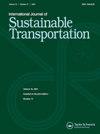环境问题的严重性认知与混合动力汽车支付意愿的影响:计划行为理论的人类学延伸
IF 3.9
3区 工程技术
Q2 ENVIRONMENTAL STUDIES
International Journal of Sustainable Transportation
Pub Date : 2024-09-01
DOI:10.1080/15568318.2024.2399166
引用次数: 0
摘要
作为一种节能交通创新,混合动力汽车(HV)具有最大限度减少碳排放和解决环境问题的潜力。本研究在计划行为理论(TPB)框架内提出了重要的理论贡献,因此具有新颖性。首先,它将对环境问题严重性的感知作为一个预测因素,从而加深了对个人对环境问题反应的理解。其次,它通过引入氢氟碳化物的支付意愿作为调节因素,扩展了 TPB 模型,承认了采用环保技术的经济性。这些新增内容丰富了 TPB 框架,为行为改变中心理决定因素和经济因素之间的相互作用提供了见解。因此,本研究旨在通过纳入两个关键因素来扩展主观能动性框架,这两个因素是:环境问题的严重性感知和为有害物质付费的意愿。我们发现,对环境问题严重性的感知对采用高压电源的态度、主观规范、感知行为控制、采用高压电源的意愿和实际使用高压电源都有积极影响。TPB 构建对采用和实际使用空调的意向有积极影响。此外,采用志愿服务的意向也对志愿服务的实际使用产生了积极影响。此外,研究结果表明,串联中介也在起作用,即环境问题的严重性感知影响了主观能动性构建,而主观能动性构建又影响了采用空调的意愿,而采用空调的意愿又影响了空调的实际使用。我们还发现,愿意为高风险产品付费在主观能动性模型中起到了促进作用。本文章由计算机程序翻译,如有差异,请以英文原文为准。
Perceived seriousness of environmental issues and the influence of willingness to pay for hybrid vehicles: An anthropological extension of the theory of planned behavior
As an energy-efficient transportation innovation, hybrid vehicles (HVs) have the potential to minimize carbon emissions and address environmental issues. The study is novel as it presents significant theoretical contributions within the theory of planned behavior (TPB) framework. Firstly, it integrates the perceived seriousness of environmental problems as a predictor, enhancing understanding of individual responses to environmental concerns. Secondly, it expands the TPB model by introducing willingness to pay for HVs as a moderator, acknowledging the economic aspect of adopting environmentally friendly technologies. These additions enrich the TPB framework, offering insights into the interplay between psychological determinants and economic considerations in behavior change. The study therefore aims to extend the TPB by incorporating two key elements: perceived seriousness of environmental issues and willingness to pay for HVs. We find that perceived seriousness of problems in the environmental has positive impact on attitude toward adoption of HVs, subjective norms, perceived behavioral control, intentions to adopt and actual use of HVs. TPB constructs have positive impact on intentions to adopt and actually use HVs. Moreover, intentions to adopt HVs also positively influence the actual use of HVs. Moreover, the results show that the serial mediations are also in play, whereby perceived seriousness of environmental issues influences TPB constructs, which influence intentions to adopt HV which in turn influence the actual use of HVs. We also find that willing to pay for HVs plays an enhancing role as a moderator in the TPB model.
求助全文
通过发布文献求助,成功后即可免费获取论文全文。
去求助
来源期刊
CiteScore
8.90
自引率
2.60%
发文量
56
期刊介绍:
The International Journal of Sustainable Transportation provides a discussion forum for the exchange of new and innovative ideas on sustainable transportation research in the context of environmental, economical, social, and engineering aspects, as well as current and future interactions of transportation systems and other urban subsystems. The scope includes the examination of overall sustainability of any transportation system, including its infrastructure, vehicle, operation, and maintenance; the integration of social science disciplines, engineering, and information technology with transportation; the understanding of the comparative aspects of different transportation systems from a global perspective; qualitative and quantitative transportation studies; and case studies, surveys, and expository papers in an international or local context. Equal emphasis is placed on the problems of sustainable transportation that are associated with passenger and freight transportation modes in both industrialized and non-industrialized areas. All submitted manuscripts are subject to initial evaluation by the Editors and, if found suitable for further consideration, to peer review by independent, anonymous expert reviewers. All peer review is single-blind. Submissions are made online via ScholarOne Manuscripts.

 求助内容:
求助内容: 应助结果提醒方式:
应助结果提醒方式:


